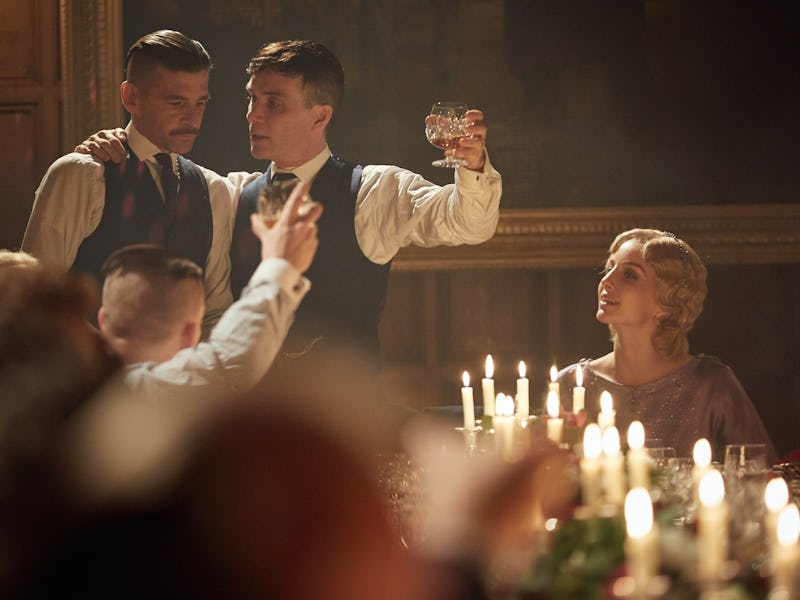'Peaky Blinders' Season 3 Has A 'Godfather Part III' Problem
The third season of the BBC and Netflix's show approached greatness, but geopolitics and the Shelby family definitely don't mix.

Late in the sixth episode of the third season of Peaky Blinders, notorious crime boss Tommy Shelby (Cillian Murphy) — exhausted, beaten down, but still cognizant — gives his family some advice after meeting with the mysterious and dangerous Georgian Duchess Tatiana Petrovna (Gaite Jansen). Petrovna and her exiled family have caused irreparable damage to Shelby and his family, because his rapid ascent in the criminal underworld through the first two seasons caused the government to use him: to carry out their less-than-legal plans. But this is no one’s fault but his own. “You have to get what you want your own way,” he tells the family before they’re led away by police in the shocking finale. Tommys “own way” propelled him to high highs and low lows in Season 3, and it might have been a bit too much. It was strangely reminiscent of The Godfather Part III, another third installment of another infamous organized crime family which arguably became too overblown for its own good.
After the Season 2 finale, which featured the Shelbys making it out of the big 1922 Derby Day hit unscathed, Season 3 picks up in 1924 — and what a difference two years makes. Tommy has made enough money in his crooked business dealings to move the family’s base of operations from dirty Birmingham tenements to a big country estate, and he immediately moves up in social stature with his marriage to Grace. It becomes evident early on in Season 3 that Tommy won’t be dealing with pesky bar-room fights at The Garrison or mere hooligans reneging on bad horse-racing bets. His station has become far bigger than we’re used too — it’s still jarring to see Tommy Shelby standing in opulent corridors better suited for Downton Abbey — and the show doesn’t really pause to let us catch up.
But the most striking difference between seasons is that Peaky Blinders, quite suddenly, is involved in a convoluted geopolitical struggle between Georgian rebels, the Soviet state, and a clandestine force within the British government, led by a corrupt priest named Father John Hughes (Paddy Considine). It seems because he was spared in the Season 2 finale, Tommy was forced to work with Hughes and the British Government on behalf of a family of deadly and exiled Georgian aristocrats. The Peakys were to ensure that a Soviet “attack” would take place on English soil via a train explosion, so that the government would have an excuse to cut off diplomatic relations and potentially engage in hostilities with the Soviets. At the same time, Tatiana’s Russian rebel royal family wanted a group of armored cars stolen and supplied by the Peakys, so they could storm back to Russia and reinstate their throne.
This all goes to hell when Tommy realizes they’re being double-crossed by Hughes as a way to mop up and implicate the Peaky Blinders once the political situation goes the government’s way. This, in turn, causes Tommy to try and double-cross them by enacting a deal with the Soviets, “to ensure that the guns and tanks planned for the uprising will prove utterly worthless.” He also concocts a plan to dig a tunnel to a vault in the Georgians’ estate, to steal precious jewelry intended to cover payment for the robbery and armored truck delivery.
If this all sounds confusing, that’s because it is, and the political machinations and implied allegiances build to a grander, and ultimately more puzzling, plot – more than viewers have ever had to deal with on Peaky Blinders. Even the official reddit thread is replete with people trying and failing to determine what all the double-crossing meant to different characters.
Perhaps it’s because Peaky Blinders plays like a British version of The Godfather, with its scruffy, outsider family trying to become something they aren’t via the criminal underworld, but Season 3’s strengths and weaknesses are, as we’ve said, reminiscent of The Godfather Part III.
When young Michael Corleone sat in that grimy New York City Italian restaurant about to assassinate mob rival Sollozzo and corrupt cop McCluskey in director Francis Ford Coppola’s first Godfather movie, would we have ever thought he’d later sit in the Vatican talking to cardinals about the family’s geopolitical dealings and stock shares in gigantic holding companies in Part III? It’s all a bit unwieldy, because it doesn’t resemble the scrappy origin stories we’ve come to appreciate. It’s the kind of territory that becomes stale to audiences who prefer their organized crime stories to be about getting to the top, not about what happens when the characters are already there.
What draws audiences to Peaky Blinders and other mob dramas is the small scale story about family at each project’s core. As these movies and shows grow, regardless of how many times the characters remind you about the importance of their brethren, the plots tend to lose focus and feel far too inflated. The somewhat convoluted but still surprising ending, with Tommy giving up his entire family to the police, makes up for it, somewhat. But the confounding explanations for how the characters got there feels like too little too late.
The good thing about Peaky Blinders, like Breaking Bad before it, is that the writers have already thought at least five steps ahead. Just when the audiences can’t imagine how the characters get out of their presently impossible situation, there comes a moment in which they make it out against all odds. This bodes well for the newly announced fourth and fifth seasons. Season 3 is by no means a bad set of episodes, but just like The Godfather Part III, it’s just not as good as what came before.